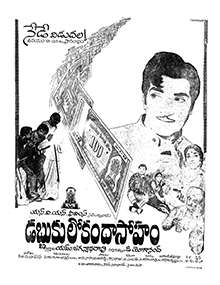Dabbuki Lokam Dasoham
Dabbuki Lokam Dasoham (transl. The World is a Slave to Money) is a 1973 Telugu-language drama film, produced by M. Jagannatha Rao under the S.V.S. Films banner[2] and directed by D. Yoganand.[3] It stars N. T. Rama Rao, Jamuna[4] in the lead roles and music composed by K. V. Mahadevan.[5]
| Dabbuki Lokam Dasoham | |
|---|---|
 Theatrical release poster | |
| Directed by | D. Yoganand |
| Produced by | M. Jagannatha Rao |
| Written by | Modukuri Johnson (story / dialogues) |
| Starring | N. T. Rama Rao Jamuna |
| Music by | K. V. Mahadevan |
| Cinematography | R. Sampath |
| Edited by | B. Gopala Rao |
Production company | S.V.S. Films[1] |
Release date |
|
Running time | 172 mins |
| Country | India |
| Language | Telugu |
Plot
The film begins in a village, Dharma Rao (S. V. Ranga Rao) it's Sarpanch behaves like a dictator with the help of drunkard brother Satyam (Satyanarayana), board members Chalamayya (Allu Ramalingaiah) and Kodandam (Sakshi Ranga Rao). In the same village, a young & energetic guy Ramu (N. T. Rama Rao) lives along with his uncle Durgayya (Mikkilineni) and sister Tulasi (Y. Vijaya). Ramu is a well-educated person who works hard to enhance the life of the struggling village by digging a well, constructing a school, establishes a union where Dharma Rao develops animosity against him. Meanwhile, Aruna (Jamuna), Dharma Rao's sister's (Nirmalamma) daughter returns to the village after completing her studies, she likes Ramu's ideologies and loves him. Dharma Rao wants to make her marriage with Satyam to grab her property. Thereafter, on request of the villagers, Ramu stands in the panchayat elections but Dharma Rao wins using his money power. At the same time, Dharma Rao ploy brings a girl Lakshmi (Leela Rani) as Ramu's wife with proofs which everyone believes expect Aruna. After that, they kill her, keeps the blame on Ramu and he is accused. On the other side, Satyam molests Tulasi and she commits suicide. In the jail, Ramu gets acquainted with Lottery Babu (Padmanabham) and Race Raju (Raavi Kondala Rao), Lottery distributes four tickets to his jail mates and says that whoever wins, the money will be equally shared by all. Ramu gets the lottery, Race Raju draws it, afterward, Lottery also joins him, both of them start up a business on Ramu's name as "Anna Enterprises" which becomes a huge industry. After some years, Ramu releases, Race Raju & Lottery hand over the business to him, but he refuses. At that point in time, Ramu learns about the injustice meted to his sister Tulasi. Now he wants to take revenge on the culprits and wants to teach a lesson to society. So, he arrives at the village and everyone is surprised to see him as a millionaire. Aruna visits but hates his present character. Parallelly, Ramu donates 10 lakhs for the welfare of the village, Dharma Rao & Satyam plans to snatch it, but Satyam was caught. Dharma Rao asks the public to punish his brother when frustrated, Satyam reveals their entire crimes and they all get arrested where Aruna realizes the virtue of Ramu. At last, Ramu tells everyone that A human should not be controlled by money, money should be in the control of human. Finally, the movie ends on a happy note with the marriage of Ramu & Aruna.
Cast
- N. T. Rama Rao as Ramu
- Jamuna as Aruna
- S. V. Ranga Rao as President Dharma Rao
- Relangi as Brahmananda Swamy
- Satyanarayana as Satyam
- Allu Ramalingaiah as Chalamaiah
- Padmanabham as Lottery Babu
- Mikkilineni as Durgaiah
- Raavi Kondala Rao as Ekambaram
- Sakshi Ranga Rao as Kodandam
- Rama Prabha as Chittithalli
- Leela Rani as Lakshmi
- Vijaya Bhanu
- Y. Vijaya as Tulasi
- Nirmalamma
Crew
- Art: Thota
- Choreography: Chinni-Sampath
- Stills: Baina
- Fights: Ratnam
- Story - Dialogues: Modukuri Johnson
- Lyrics: C. Narayana Reddy, Kosaraju
- Playback: Ghantasala, P. Susheela, Madhavapeddi Satyam, Pithapuram, L.R.Eswari, Jayadev. Mohan Raju, P. Benerjee, Ramadevi
- Music: K. V. Mahadevan
- Editing: B. Gopala Rao
- Cinematography: R. Sampath
- Producer: M. Jagannatha Rao
- Screenplay - Director: D. Yoganand
- Banner: SVS Films
- Release Date: 12 January 1973
Soundtrack
| Dabbuki Lokam Dasoham | ||||
|---|---|---|---|---|
| Film score by | ||||
| Released | 1973 | |||
| Genre | Soundtrack | |||
| Length | 33:16 | |||
| Producer | K. V. Mahadevan | |||
| K. V. Mahadevan chronology | ||||
| ||||
Music composed by K. V. Mahadevan. Music released by Audio Company.
| S. No. | Song Title | Lyrics | Singers | length |
|---|---|---|---|---|
| 1 | "Ek Do Teen" | Kosaraju | Ghantasala | 4:26 |
| 2 | "Gaali Okkanisommu Kaadu" | C. Narayana Reddy | Ghantasala, P. Susheela, Ramadevi | 4:11 |
| 3 | "Nuvvu Nenu" | C. Narayana Reddy | Ghantasala, P. Susheela | 4:14 |
| 4 | "Thaaguthaa Neeyavva" | Kosaraju | Madhavapeddi Satyam | 4:14 |
| 5 | "Chusthunava O Deva" | C. Narayana Reddy | Ghantasala | 3:32 |
| 6 | "Chepalani Vunadi" | Kosaraju | Pithapuram, L.R.Eswari | 3:56 |
| 7 | "Nuvvu Nenu" | C. Narayana Reddy | Ghantasala | 3:28 |
| 8 | "Dabbuku Lokam Daasoham" | C. Narayana Reddy | Madhavapeddi Satyam, Pithapuram, Mohan Raju, P. Benerjee | 5:15 |
References
- "Dabbuki Lokam Dasoham (Ovrview)". Youtube.
- "Dabbuki Lokam Dasoham (Banner)". Chitr.com.
- "Dabbuki Lokam Dasoham (Direction)". Filmiclub.
- "Dabbuki Lokam Dasoham (Cast & Crew)". Tollywood Times.
- "Dabbuki Lokam Dasoham (Review)". Bharat Movies.